| Home > Living In China |
Muslim Restaurants in China
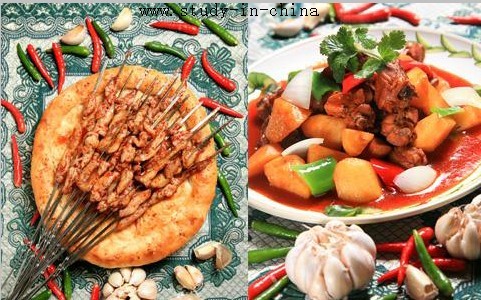
August 2011 is Ramadan, during which Muslims fast from sunrise to sunset. It’s a period for internal and spiritual cleansing and is the holiest time for believers of Islam. Like Chinese New Year, the date varies yearly according to the lunar calendar, beginning with the sighting of a crescent new moon.
There are thought to be over 20 million Chinese Muslims in the PRC, with communities in every province. Gaining a foothold during the Mongol-Yuan dynasty, the Muslim community grew largely in tandem with the trade along the Silk Road that brought about faith, lore and spice. The Hui, mostly from the provinces of Qinghai, Gansu and Ningxia, are considered an ethnic minority and comprise the largest Muslim group in China. The Uyghurs, primarily from Xinjiang, follow second in concentration and have a different language, culture and popular cuisine. The remainder is largely made up of others of Turkic origin.
With such distinctions, it’s no surprise that Chinese Muslim food culture differs greatly from that of the Middle East. However, it places similar requirements on ingredients that are considered Halal (哈拉勒, meaning lawful under Islam). Herbivorous or ruminant animals form the majority of Halal food in China and are slaughtered according to Islamic law, which makes pork verboten and limits variety generally to lamb, beef and chicken. Many eschew fish altogether. While Chinese Muslim cuisine is less restricted, with alcohol usually offered at Muslim restaurants (Islamic law prohibits its consumption), it has plenty of fans without any religious convictions.
Beijing’s best-known mosque, Niujie, in Xuanwu district, encloses a minaret that looks like a pagoda, with Arabic calligraphy in classic Chinese style – a stunning example of the two cultures crossing over. Like much of Beijing, over time, the street has changed, but the local community keeps things alive and nearby restaurants still serve daily.
Eid al-fitr is the celebratory feast to break the month-long fast, but you don’t have to wait since Muslim restaurants in Beijing remain open throughout the month. In the spirit of Ramadan, try some of these Muslim restaurants in Beijing for a taste of something different... 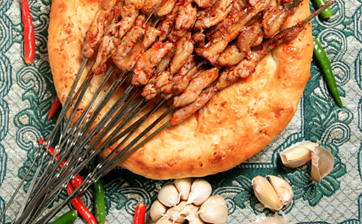
The Xinjiang Fanzhuang (新疆饭庄)
This is one of the most revered destinations in the city for excellent food from Xinjiang, especially Urumqi cuisine. As is common with government restaurants, it is housed inside a hotel. From Xinjiang lamb to the treasure of nut and dried fruit-laden bowls of homemade yoghurt, just about everything is reliably good here. Also make sure to order the flat and doughy sesame breads or hand-pulled noodles.
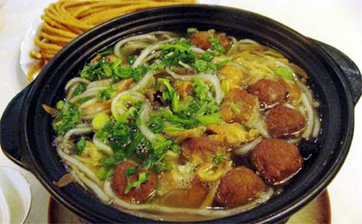
Ningxia Hotel Restaurant (宁夏大厦)
Ningxia holds claim to a large population of Hui Muslims. This restaurant’s ownership by the autonomous region’s Beijing government office ensures the kitchen can get hold of fine ingredients – such as lamb from Tanyang that’s raised on mountain herbs including liquorice and alfalfa, rendering the meat less gamey. You can order the whole roast animal or battered, fried parts that are lightly sweet and herbal. Chicken from Zhongning, the land of goji berries is sweet and the basis for a basin of grandmotherly soup. The mix of bitter greens is available year round along with award-winning Ningxia wines. Most employees here are Hui Muslim students from hotel and tourism school, so be patient.
Ziguang Yuan (紫光园)
An exemplary Hui Muslim restaurant, the food here keeps in tradition. Baodu (爆肚), a classic Hui tripe dish, is available along with a plateful of tangliu juanguo (糖溜卷果), chunks of sweetmeat with yam, dates, sour plums and walnuts that are sticky with hints of Silk Road flavours. The lovable mung bean mush with lamb fat, madoufu (麻豆腐), goes well with garlicky slices of lamb head cheese called suantouyangtou (蒜头羊头). This is also where to order you xiang (油香), golden fluffy Muslim beignets doused with sugar.
BLCU Muslim Restaurant (北京语言大学穆斯林餐厅)
The Muslim canteen at Beijing Language and Culture University (BLCU) is a rare showcase for excellent cafeteria food. The newly constructed building houses a shiny copper grill, slowly blackening in authenticity. A menu that’s priced for tight budgets is a cinch to figure out. Order any type of kebab, served on a ‘plate’ of hot, fresh nang bread.
The Muslim Supermarket Restaurant (牛街清真超市美食城)
Down the street from the Niujie Mosque is this deceptively named restaurant that’s really a second-floor food court. Buy a credit-loaded card and swipe away from counter to counter. You won’t find groceries but there’s a massive variety of Muslim fare and snacks. With a group, you can sample easily while spoilt for choice. A central drinks stand also offers plenty of beer on tap.
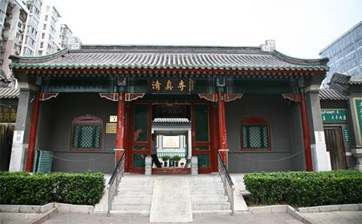
Nan Dou Ya Mosque (南豆芽清真寺)
The entrance to this mosque is winged with both a restaurant and a Halal butcher, set on a busy lane off Chaoyangmennei. The Nan Dou Ya Mosque welcomes you for early-morning typical Chinese breakfasts. You can even find fresh lamb cut to order. Choose from a full menu of Muslim fare. By day, a lamby version of roujiamo in a crisp sesame bun comes along with a cloudy offal broth that’s rich with flavour. Roasted lamb bits and other stir-fry dishes are more familiar.
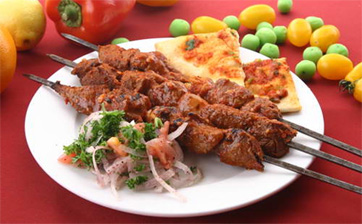
A Thousand and One Nights Restaurant (一千零一夜)
A clamorous nightly bellydance is worth tolerating for some of the best hummus, with pine-nutty scented olive oil running over silky chickpeas. Lots of kebabs and the usual Middle Eastern fare are available, but a uniquely Syrian dish of frickeh with chicken is something to try. The green wheat berries are firm, full of flavour and addictively fun to eat. Add fresh lobes of warm-risen pita and you’ll be back.
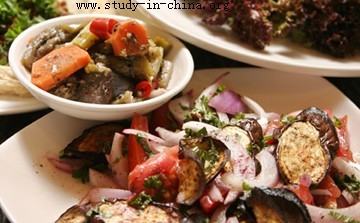
Rumi
With a nifty playroom for little ones and a sophisticated white interior evoking a soft ambiance, Rumi contributes something different to the Middle Eastern block on Gongti Bei Lu. The Persian cuisines boasts a richness of exotic fruits and nuts and sharp spices such as sumac. A fantastic selection of mezze includes some terrific baba ghanoush and a selection of hummus. Garlic pickles and shallot-scented yoghurt are refreshing. Yes, there are kebabs everywhere, but the Persian stews including the okra with beef are grand. Stay and smoke a hookah. No alcohol is served at Rumi but you’re welcome to BYO.
Punjabi
While not strictly Muslim, Punjabi offers an excellent, diverse Halal menu that covers most of the Indian subcontinent and a selection of Indo-Chinese food. A 98RMB buffet is available on Tuesdays, Fridays and Saturdays, but will distract you from the grand menu selection. Four Indian chefs have created a special Ramadan set menu for the entire month of August that begins with sweet dates and ends with a Kashmiri cardamom-saffron rice pudding.
Custom
 more
moreWeb Dictionary
Primary&secondary
Beijing National Day School
Beijing Concord College of Sino-Canada
Brief Introduction of BCCSC Established in the year 1993, Huijia School is a K-12 boarding priva...Beijing Huijia Private School





 print
print  email
email  Favorite
Favorite  Transtlate
Transtlate 







